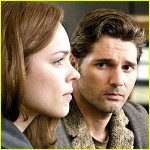 Many major film stars in the new millennium are finding science fiction to be a comfortable setting for them, from Will Smith and Tommy Lee Jones to Robert Downey Jr and Sigourney Weaver, unlike their counterparts from the 1950s who, in some instances, went to Sci-Fi as a last resort. Funny how the world has changed and the respectability of fantasy movies (along with the revenues generated by the Harry Potter series, Lord of The Rings, Star Wars, Terminator films and so on and so forth) has changed the playing field considerably.
Many major film stars in the new millennium are finding science fiction to be a comfortable setting for them, from Will Smith and Tommy Lee Jones to Robert Downey Jr and Sigourney Weaver, unlike their counterparts from the 1950s who, in some instances, went to Sci-Fi as a last resort. Funny how the world has changed and the respectability of fantasy movies (along with the revenues generated by the Harry Potter series, Lord of The Rings, Star Wars, Terminator films and so on and so forth) has changed the playing field considerably.
Where Eric McCormack traded in his Will & Grace stereotype for 2008’s The Andromeda Strain, Eric Bana is also getting some serious face-time in the world of fantasy pictures. Bana was excellent as Bruce Banner in Hulk, his character only suffering from Ang Lee’s computer-generated monsters having little substance, despite the actor’s honest efforts as an A-list leading man.
Co-producer Gale Ann Hurd’s sequel, The Incredible Hulk, really didn’t generate much more in the cash department than the flick that preceded it (check the figures at Boxofficemojo.com) …and Bana’s replacement, Edward Norton, just came off as some wimpy pseudo scientist, almost as bad a job of casting as Michael Keaton in Batman. Bill Bixby must be spinning. Which brings us to The Time Traveler’s Wife.
The image or thought of Sex In The City meets H.G. Wells might not sound too inviting on paper, but the film surprises with strong energy and intriguing scenarios that do what a good Sci-Fi flick is supposed to do – make one think while being entertained.
Director Robert Schwentke keeps the conflict firmly alongside the love story, multiple conflicts, actually, with Michelle Nolden as Annette DeTamble and Bana as Henry DeTamble, having to rely on their thespian abilities, not technical wizardry, with the only real “special effects” being the director’s ability to erase poor Henry out of the picture at will. It’s the overabundance of time-lines that build the suspense- think Scott Bakula in Quantum Leap – with all that leaping so very out of control and no Mr. Spock to help make sense of the illogical circumstance. You won’t need a scorecard, though the “channel changing” of Henry’s life -and his switching from youthful to early middle-age – does become unnerving and builds genuine sympathy for the character.
Audrey Niffenegger’s 2003 debut novel got to the screen rather quickly, and the Wikipedia is insightful noting that the book “uses time travel to explore miscommunication and distance in relationships. It also investigates deeper existential questions.” Perhaps by having a middle-aged man become twenty-something again, author Niffenegger was building excuses for the men who reportedly let her down, and whose unreliability became the possible inspiration for this work.
The actors do a fine job of dealing with the multiple time-lines, their lives as adults, early middle-age and adolescence creating a jumble that Henry/Bana has to figure out as he’s being thrown from one vignette to the next, usually resulting in a major dilemma since he shows up in his new surroundings as stark naked as Arnold Schwarzenegger or Robert Patrick in The Terminator films. At least good old H.G. Wells gave his protagonist a time machine that he could enter with suit and tie! The indignity of it all. Released on August 14th, 2009 – ten years and eight days after Toni Collette as Mrs. Malcolm Crowe would have dinner at a table alone without her husband (Bruce Willis) in The Sixth Sense (released August 6th, 1999), Michelle Nolden gets to re-enact the same scene, with somewhat similar circumstances, waiting for a husband/lover who may never come back.
The multi-layered subtleties that are said to be the original novel’s strength make for an usual fantasy film/love story that is geared to the chicks, but which the guys will find to their liking.








